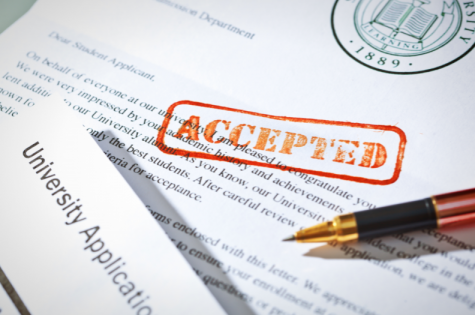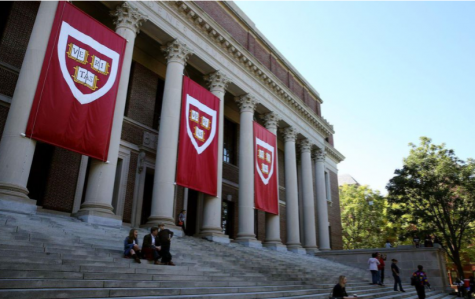Why the 2020-2021 College Admissions Process will be More Competitive
This is an opinion piece. Lindsay Kupka is a junior at Mendham High School who writes for Sports. All of the views expressed in the following editorial are her own and do not necessarily reflect the views of The Patriot.
In these unprecedented times, the CollegeBoard has cancelled SAT through the 2020 Summer. As of May 12th, 2020, the August 29th SAT date is still on and the CollegeBoard has added a September 26th date. The closest ACT date is still June 13th, but this information is subject to change as quarantine drags on and social distancing measures are still in place. National Decision Day on May 1st for the class of 2020 was bittersweet for the juniors of the United States as they celebrated the seniors’ success, but also realized how complicated the 2021 admissions process is going to be.

Many juniors are wondering what will be taken into account to be accepted to colleges this fall.
According to leading studies, students should take their preferred test, whether it is the SAT or the ACT, around 1-3 times to optimize their score. Test prep has been cancelled across the country and many students have to choose between trying to set up online prep sessions, or prep for their respective test independently which has not yet proven to be effective in higher scores. Additionally, many juniors from the class of 2021 have not started test preparation due to the math curriculum on the SAT. The math section of the SAT includes math up to the end of Algebra 2, a class that a large percentage of juniors will be finishing at the end of this coming school year. Because juniors were under the impression that they would have this spring, summer, and early fall to prepare their tests, many did not take tests and the vast majority of students have not been able to take the tests 1-3 times in order to get their best scores.
Many colleges have already taken this factor into account. Among the schools that have announced that they are going test optional for the 2021 college admission process are Williams College, Amherst College, Tufts University, Northeastern University, Boston University, Vassar College, Haverford College, Davidson College, University of Washington, University of Oregon, Tulane University, the entire UC system, and even Cornell and Harvard. In a statement from Harvard, the university said that “We know that there are fewer opportunities to take the SAT or ACT given the cancellations to date,” and that applying students “will not be disadvantaged in any way if you do not submit subject tests”. However, now juniors have to worry about distinguishing themselves from other applicants in an admissions process that will be infinitely complicated. Also included in Harvard’s statement regarding the admissions process for the class of 2021 was information regarding other disadvantages that juniors may face, like lack of internships or community service. The statement continues to emphasize that they will be flexible and that “students who find themselves limited in the activities they can pursue due to the current coronavirus will not be disadvantaged.” Previously the college process had been holistic consisting of GPA, test scores, and community service. But now, the statement raises alarm and displays how vastly different this process will be for the class of 2021. If potential students will not be disadvantaged for lack of perfect test scores, inconsistent GPAs among applicants due to the Pass/Fail system that some high schools are using, and no internship or community service hours, then what are colleges going to be looking for?
It is impossible for anyone to have a clear answer at this time. At this point, colleges and universities are planning to have students return to campuses in the fall but nothing has truly been set in stone. With this level of uncertainty, colleges and universities cannot send out the usual promotions or hold tours to entice potential students to want to come to that school. Although this may seem good for students and like colleges will be more flexible and accommodating, thus possibly accepting more students from a broader pool of applicants, I believe that this unprecedented process will become more competitive for the Class of 2021.
Before the global pandemic, students knew what was necessary in order to get into a school. They were taught to study hard, raise their GPAs, do test prep, be involved in their school community, and complete community service hours. Some students have been involved in extracurriculars like clubs or sports since their freshman year, however others may have been waiting for this summer and spring to exercise their newfound maturity and position as an upperclassmen. Many leadership positions in clubs and other extracurriculars are only given to juniors and seniors, meaning that the class of 2021 had very limited opportunities to obtain being president of a club or other notable accomplishments that students feel proud to put on their college applications. It is certainly going to be challenging for colleges to discern between students who were more involved during the earlier high school years than someone else who had big plans for this spring or summer.
According to Canh Oxelson, head of college counseling at the Horace Mann school, “juniors will be applying for admission at a time when colleges will need to be as flexible and open-minded as they’ve ever been. You’ve now seen statements from colleges attesting to exactly that: ‘Given the circumstances, we will be flexible and understanding in considering your academic record.’”

Harvard is one of the many schools that has gone test optional for 2020-2021.
I disagree with this statement for a few reasons. I believe that while certain colleges may be more flexible, that other colleges will not have a certain plan on how to accept or reject students in a fair way. How can colleges and universities be fair? It is impossible to try and claim that the 2020-2021 admissions process will be fair due to the vast inconsistencies between students. How can a college find a balance between rewarding the student who already had the test scores, but now has a messed up or inflated GPA because of the Pass/Fail system? Or on the other side of the spectrum, how does a college find a way to not punish a student who loves community service and is unable to complete their project? Or someone who is unable to get their best score? The process will be very tricky come Fall of 2020, but it will certainly not be easier or less competitive. Additionally, this statement is flawed because it gives potential students a slippery-slope peace of mind. Just because colleges will be more flexible than before does not mean that students should stop working hard and feel complacent. Students should control what they can and continue to do what is routine in order to be accepted to a college that is a great fit for them, although they may feel like their work is in vain.
The lack of a typical and holistic application will force universities across the United States to make tough decisions regarding the class of 2021 and will ultimately make the process more difficult and competitive. Overall, the admissions process for 2020-21 will be one with very diverse and varying results. Whatever happens during this time, the class of 2021, and others applying in 2020-2021, should be proud of their persistence and for continuing to work hard and remaining steadfast in their beliefs and schoolwork.

Lindsay Kupka is a current junior at West Morris Mendham High School. Lindsay is a member of the varsity soccer and lacrosse teams, and plays basketball...





